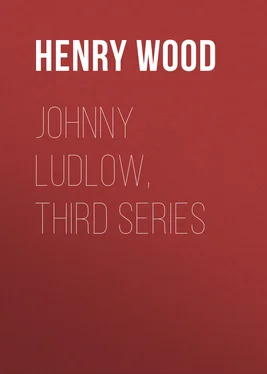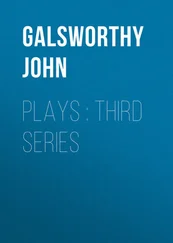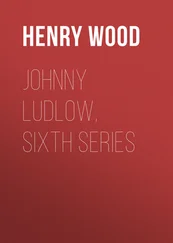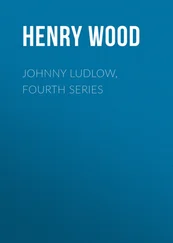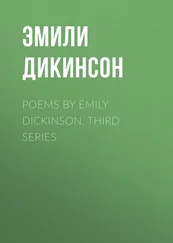Henry Wood - Johnny Ludlow, Third Series
Здесь есть возможность читать онлайн «Henry Wood - Johnny Ludlow, Third Series» — ознакомительный отрывок электронной книги совершенно бесплатно, а после прочтения отрывка купить полную версию. В некоторых случаях можно слушать аудио, скачать через торрент в формате fb2 и присутствует краткое содержание. Жанр: foreign_prose, literature_19, foreign_antique, на английском языке. Описание произведения, (предисловие) а так же отзывы посетителей доступны на портале библиотеки ЛибКат.
- Название:Johnny Ludlow, Third Series
- Автор:
- Жанр:
- Год:неизвестен
- ISBN:нет данных
- Рейтинг книги:4 / 5. Голосов: 1
-
Избранное:Добавить в избранное
- Отзывы:
-
Ваша оценка:
- 80
- 1
- 2
- 3
- 4
- 5
Johnny Ludlow, Third Series: краткое содержание, описание и аннотация
Предлагаем к чтению аннотацию, описание, краткое содержание или предисловие (зависит от того, что написал сам автор книги «Johnny Ludlow, Third Series»). Если вы не нашли необходимую информацию о книге — напишите в комментариях, мы постараемся отыскать её.
Johnny Ludlow, Third Series — читать онлайн ознакомительный отрывок
Ниже представлен текст книги, разбитый по страницам. Система сохранения места последней прочитанной страницы, позволяет с удобством читать онлайн бесплатно книгу «Johnny Ludlow, Third Series», без необходимости каждый раз заново искать на чём Вы остановились. Поставьте закладку, и сможете в любой момент перейти на страницу, на которой закончили чтение.
Интервал:
Закладка:
“And with justice,” said Tod, boldly.
“True. The world has been against me and I against the world. But it has not come yet with me to stealing children. With the loan of the money now safe in my pocket, I shall make a fresh start in life. A precious long time your step-mother kept me waiting for it.”
“She did her best. You ought not to have applied to her at all.”
“I know that: it should have been to the other side of the house. She prevented me: wanting, she said, to spare you and your father.”
“The knowledge of the disgrace. Yes.”
“There’s no need to have recourse to hard names, Joseph Todhetley. What I am, I am, but you have not much cause to grumble, for I don’t trouble you often. As many thousand miles away as the seas can put between me and England, I’m going now: and it’s nearly as many chances to one against your ever seeing me again.”
Tod turned to depart: the intensely haughty look his face wore at odd moments had been upon it throughout the interview. Had he been a woman he might have stood with his skirts picked up, as if to save them contamination from some kind of reptile. He stayed for a final word.
“Then I may take your answer in good faith—that you know nothing of Hugh?”
“Take it, or not, as you please. If I knew that I was going to stand next minute in the presence of Heaven, I could not give it more truthfully. For the child’s own sake, I hope he will be found. Why don’t you ask the man who owns the rooms?—he can tell you I have had no boy here. If you choose to watch me away to-night, do so; you’ll see I go alone. A child with me! I might about as well give myself up to the law at once, for I shouldn’t long remain out of its clutches, Joseph Todhetley.”
“Good-morning,” said Tod shortly. I echoed the words, and we were civilly answered. As we went out, Arne shut the door behind us. In the middle of the passage stood Cookum.
“Have you found he was who you wanted, sir?”
“Yes,” answered Tod, not vouchsafing to explain. “Another time when I say I do not wish to harm you, perhaps you’ll take my word.”
Mrs. Todhetley, pale and anxious, was standing under the mulberry-tree when we got back. She came across the grass.
“Any news?” cried Tod. As if the sight of her was not enough, that he need have asked!
“No, no, Joseph. Did you see him?”
“Yes, he had not left. He knows nothing of Hugh.”
“I had no hope that he did,” moaned poor Mrs. Todhetley. “All he wanted was the money.”
We turned into the dining-room by the glass-doors, and it seemed to strike out a gloomy chill. On the wall near the window, there was a chalk drawing of Hugh in colours, hung up by a bit of common string. It was only a rough sketch that Jane Coney had done half in sport; but it was like him, especially in the blue eyes and the pretty light hair.
“Where’s my father?” asked Tod.
“Gone riding over to the brick-fields again,” she answered: “he cannot get it out of his mind that Hugh must be there. Joseph, as Mr. Arne has nothing to do with the loss, we can still spare your father the knowledge that he has been here. Spare it, I mean, for good.”
“Yes. Thank you.”
Hugh was uncommonly fond of old Massock’s brick-fields; he would go there on any occasion that offered, had once or twice strayed there a truant; sending Hannah, for the time being, into a state of mortal fright. The Squire’s opinion was that Hugh must have decamped there some time in the course of the Friday afternoon, perhaps followed the gig; and was staying there, afraid to come home.
“He might have hung on to the tail of the gig itself, and I and Johnny never have seen him, the ’cute Turk,” argued the Squire.
Which I knew was just as likely as that he had, unseen, hung on to the moon. In the state he had brought his clothes to, he wouldn’t have gone to the brick-fields at all. The Squire did not seem so uneasy as he might have been. Hugh would be sure to turn up, he said, and should get the soundest whipping any young rascal ever had.
But he came riding back from the brick-fields as before—without him. Tod, awfully impatient, met him in the road by the yellow barn. The Squire got off his horse there, for Luke Mackintosh was at hand to take it.
“Father, I cannot think of any other place he can have got to: we have searched everywhere. Can you?”
“Not I, Joe. Don’t be down-hearted. He’ll turn up; he’ll turn up. Halloa!” broke off the Squire as an idea struck him, “has this barn been searched?”
“He can’t be in there, sir; it’s just a moral impossibility that he could be,” spoke up Mackintosh. “The place was empty, which I can be upon my oath, when I locked it up yesterday afternoon, after getting some corn out; and the key have never been out o’ my trousers’ pocket since. Mr. Joseph, he was inside with me at the time, and knows it.”
Tod nodded assent, and the Squire walked away. As there was no other accessible entrance to the front barn, and the windows were ever so many yards from the ground, they felt that it must be, as the man said, a “moral impossibility.”
The day went on, it was Saturday, remember, and the miserable hours went on, and there came no trace of the child. The Ravine was again searched thoroughly: that is, as thoroughly as its overgrown state permitted. It was like waste of time; for Hugh would not have hidden himself in it; and if he had fallen over the fence he would have been found before from the traces that must have been left in the bushes. The searchers would come in, one after another, now a farm-servant, now one of the police, bringing no news, except of defeat, but hoping some one else had brought it. Every time that Tod looked at the poor mild face of Mrs. Todhetley, always meek and patient, striving ever to hide the anguish that each fresh disappointment brought, I know he felt ready to hang himself. It was getting dusk when Maria Lease came up with a piece of straw hat that she had found in the withy walk. But both Mrs. Todhetley and Hannah, upon looking at it, decided that the straw was of finer grain than Hugh’s.
That afternoon they dragged the pond, but there was nothing found in it. We could get no traces anywhere. No one had seen him, no one heard of him. From the moment when I had watched him into the fold-yard gate, it seemed that he had altogether vanished from above ground. Since then all scent of him was missing. It was very strange: just as though the boy had been spirited away.
Sunday morning rose. As lovely a Sunday as ever this world saw, but all sad for us. Tod had flung himself back in the pater’s easy-chair, pretty near done over. Two nights, and he had not been to bed. In spite of his faith in Alfred Arne’s denial, he had chosen to watch him away in the night from Timberdale; and he saw the man steal off in the darkness on foot and alone. The incessant hunting about was bringing its reaction on Tod, and the fatigue of body and mind began to show itself. But as to giving in, he’d never do that, and would be as likely as not to walk and worry himself into a fever.
The day was warm and beautiful; the glass-doors stood open to the sweet summer air. Light fleecy clouds floated over the blue sky, the sun shone on the green grass of the lawn and sparkled amidst the leaves of the great mulberry-tree. Butterflies flitted past in pairs, chasing each other; bees sent forth their hum as they sipped the honey-dew from the flowers; the birds sang their love-songs on the boughs: all seemed happiness outside, as if to mock our care within.
Tod lay back with his eyes closed: I sat on the arm of the old red sofa. The bells of North Crabb Church rang out for morning service. It was rather a cracked old peal, but on great occasions the ringers assembled and did their best. The Bishop of Worcester was coming over to-day to preach a charity sermon: and North Crabb never had anything greater than that. Tod opened his eyes and listened in silence.
Читать дальшеИнтервал:
Закладка:
Похожие книги на «Johnny Ludlow, Third Series»
Представляем Вашему вниманию похожие книги на «Johnny Ludlow, Third Series» списком для выбора. Мы отобрали схожую по названию и смыслу литературу в надежде предоставить читателям больше вариантов отыскать новые, интересные, ещё непрочитанные произведения.
Обсуждение, отзывы о книге «Johnny Ludlow, Third Series» и просто собственные мнения читателей. Оставьте ваши комментарии, напишите, что Вы думаете о произведении, его смысле или главных героях. Укажите что конкретно понравилось, а что нет, и почему Вы так считаете.
